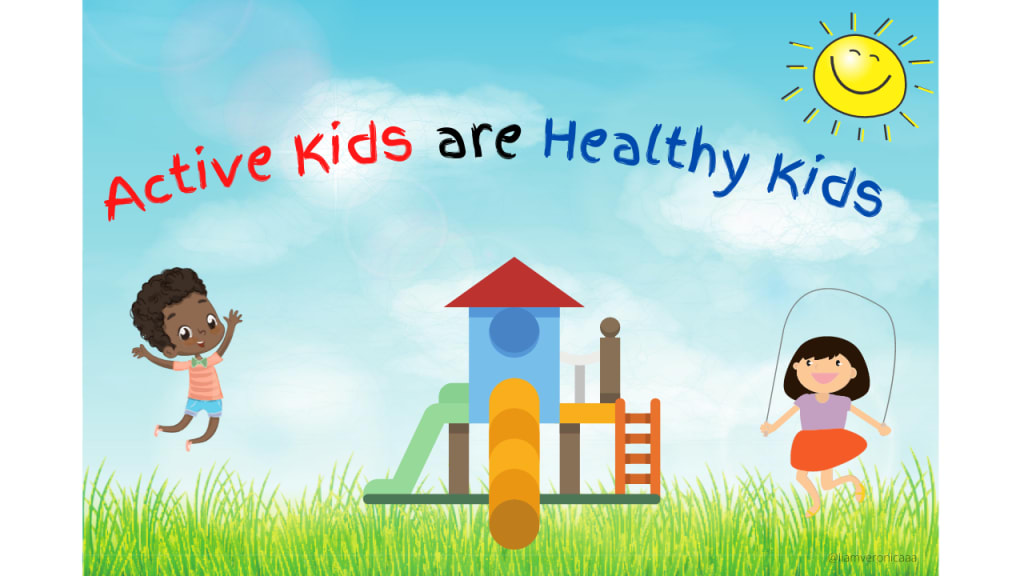
What Children Gain From Being More Active
Just like adults, increase in physical activity has been linked to better health and reduced chronic diseases in children. But there are a lot of other benefits that any child can gain from being physically active, these include but are not limited to:
- Better sleep
- Better academic performance
- Improved brain development, function, and creativity
- Improved ability to handle physical and emotional challenges
- Build strong bones
How Much Is Enough?
How do we know how much physical activity is enough for our children? This all depends on how old your child is and how active they are throughout the day. Preschool-aged children, ages 3 through 5, should be physically active throughout the day for growth and development. Children and adolescents, ages 6 through 17 years old, are recommended to 120 minutes of moderate to vigorous activity per day. I know this may sound like a lot but don't worry! You can break this 120 minutes into 60 minutes of unstructured activity or free play and 60 minutes of structured activity. Although, providing 120 minutes of activity doesn't mean to increase outdoor playtime. Studies show that recess and outdoor playtime does not necessarily increase physical activity for every child. For active children it may mean more active play for them. But for some children who typically choose to do more sedentary activity may not run around or be as active as others, even outside. Remember that every child is different.
Home vs. Child Care

A common problem with making sure that your child gets enough physical activity is that he/she may not always be in your care. If your child is attending a child care facility or any school, you cannot assume that the teacher is meeting the physical activity minutes for the day. On contrary, teachers cannot assume the child is achieving his/her physical activity goals at home. Therefore, it is important to communicate openly with your child's teacher and together understand the physical activity daily practices of your child. Additionally, while teachers may promote physical activity in their classroom, as a parent your role at home is vital. If your not, reinforce fundamental movement skills and provide additional opportunities for active play.
120 Minutes? Help!
While 120 minutes may sound like a long time, it can be broken up into two 60 minutes activity sessions. One 60 minutes session should be spent doing structured activity, meaning adult-led physical activities with an intended outcome. The other 60 minutes or more may be unstructured or active free play. Remember children should not be sedentary for longer than 60 minutes. Be sure to get your children up and get them moving all throughout the day!

Structured Play
Structured play is an organized or guided activity, with intentional goals and/or objectives that give children opportunities to practice key fundamental movement skills, such as those found in state or local Pre-K standards. These activities can also teach children their letter, colors, numbers, and even more!
Examples of Structured Play:
- Red Light, Green Light - uses colors to teach a children to reach the finish line by walking, jogging, or running
- Dance - use various musical genres and lyrical messaging to teach children simple dance movements
- Hopscotch - uses numbers to teach a child to hop on one foot
- Sports Drills - this teaches physical motor skills such as dribbling, catching or throwing a ball

Unstructured Play
Unstructured play is free time playing at the park, on the school playground, or with friends in a safe and guided environment. This sometimes means providing sports and/or playground equipment, stencils on the ground or any other child appropriate props for them to choose from. Your child is free to do whatever kind of physical activity he/she chooses. Unstructured play helps children develop their sense of independence and social interaction. Encourage your child to play outdoors as much as possible, whether at the park, playground, or even on a nature walk.

Moderate to Vigorous Physical Activity
As mentioned earlier, children are recommended to 120 minutes of moderate to vigorous activity per day. But what does that actually mean? Moderate to vigorous refers to large body movement activities that significantly increase breathing and use of arms and/or legs (not just hands).
Moderate Physical Activity:
- Playing on outdoor playground equipment, swinging, moving about, or tumbling
- Brisk walking
- Playing 4-square, swimming, hopscotch, kickball, bicycling, or ball games
Vigorous Physical Activity:
- Running, hiking, galloping, hopping, or jogging up a hill
- Playing sports such as basketball or soccer
- Jumping Jacks
- Playing running and/or jumping games
- Dancing or skipping to music
Keep Your Children Active
It is important to keep your child(ren) active on a daily basis. 120 minutes or more of physical activity is the key. If you find them sitting around for 60 minutes make sure to get them up and active. Getting your child active isn't just beneficial for their health but also improves their brain development. Remember, your child may not always be in your care 24/7, it is vital that you as the parent, ensures that your child(ren) gets enough physical activity everyday.
For more info visit:
https://www.cdc.gov/physicalactivity/basics/children/index.htm
About the Creator
Veronica
Exploring the world through words. 🌍✍️ Articles, stories, and poems on places, food, family fun, and the beauty of everyday life. Join me on a journey of discovery and imagination.






Comments
There are no comments for this story
Be the first to respond and start the conversation.